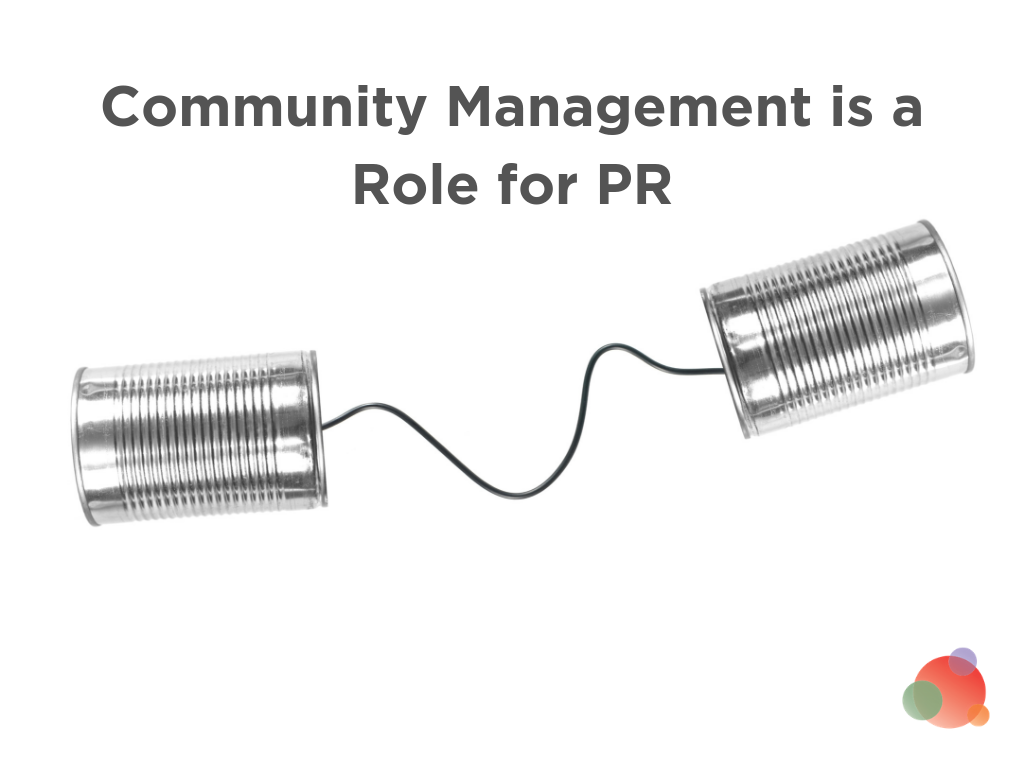 Or should be.
Or should be.
When I first heard about community management and what community managers did, I thought, “That is the perfect job for me!”
Like many of you, I’m a social introvert, have been told I’m a pretty good listener, and consider myself creative.
And my undergrad was in film, theater, and TV …
So what could be better than being a virtual ringmaster or MC?
I could turn out fun and informative stories, build relationships, solve problems—all from the comfort and safety of my own screen.
Of course, circumstances conspired against me.
For one thing, I was an agency owner and couldn’t shirk my responsibilities.
Those were the early days of social media, around the time I met Gini Dietrich in real-life at PRSA Counselors Academy, and we both had growing firms with employees, lots of overhead, and less than 1,000 followers on Twitter :).
Community Management is a Lot Like PR
The beginning of social media was an exciting time.
And the possibility of repositioning the role communications professionals might play and the value we could add was very real.
In fact, according to Altimeter’s State of Social Business, in 2011 marketing and PR were neck and neck in terms of who was responsible for social media.
(Unfortunately, that gap increased significantly by 2015, but that’s another story.)
What initially struck me about community management was the similarity to so many of the things we did in communications.
In fact, way back when, I even wrote a post about that for Spin Sucks.
Community management and PR seemed like such a good fit.
I mean, consider what we both do.
We develop relationships, create content, answer questions, and help bridge the internal and external communications gap.
It’s a natural connection.
Too Junior?
But the integration didn’t happen.
Maybe communications leaders viewed community management as too junior a position to take seriously.
Or perhaps, it was because of our seemingly natural reticence for change.
I vividly remember a conversation I had with an ad agency exec.
He told me he hired a junior at $50K to be the community manager for two client accounts and could charge the clients a flat fee, and make a hefty profit.
That’s when I realized this was a battle PR was likely going to lose (if they even played at all).
Because too many agencies would never forego the almighty billable hour.
Yet, the ad exec had already figured out how to make it work. (But I digress.)
Community Management and the PESO Model
When you think about it, a communications-led community management team fits well in the PESO model.
Owned and Shared: The community itself is a combination of owned and shared media. That is, if there’s a true two-way exhange of information. The organization may administer the community (owned), but in order for it to succeed, it needs to become a shared platform. That is, both the organization and participants should feel free to share ideas and have an open conversation. And that can only happen when you build trust. That’s why it’s important for the manager to let their community take on a life of its own, and encourage members to develop relationships with each other so the organization isn’t always the intermediary. And hopefully the members will spread the word on social, and invite others in their network to join.
Earned, Owned, and Paid: If you’ve created a place people want to hang out, you can ask for the community’s help, to offer product suggestions, or develop user generated content that could be publicized via earned media or promoted via paid. In addition, community members and their achievements could be celebrated by the organization either via earned, owned or paid media, or a combination of all three.
Have We Missed the Community Management Boat?
I’m an optimist, so I believe if we can make a good business case for it, there’s no reason why we communications can’t have another shot at integrating community management into our skillset.
Here are four recommendations on how to make that happen:
- Make it a strategic role. Change the meaning of the CCO title so it stands for Chief Communications and Community Officer. That way your community, which includes customers, supporters, ambassadors, and prospects—and is probably your most important audience—will have a strategic advocate in the C-Suite.
- Use it as your boundary spanning hub. By starting social listening with your community and expanding out to social and other channels, you’ll have a sharper early warning system, a barometer for issues and opportunities, and a core of people you can trust at the center, in good times and bad.
- Look at the numbers. And I don’t just mean the number of members your community has. Dig into your analytics and look for insights and trends. If you have a data scientist on your team, use machine learning or AI to discover patterns that could shape your strategy and improve engagement.
- Don’t forget to add some glitz. I like to say that with social media, we’re all in showbiz, at least a little. What I mean is, you need to make sure your team is trained to produce great stories and personalized responses, whether in print, video, infographics, podcasts, images, and GIFs—quickly and creatively. And know which media to use in every situation. That takes talent, judgment, and practice.
Over to Our Community
Now it’s your turn.
What do you think about the integration of community manager and PR? Is that a good fit? What are some of the challenges? How about making it a more senior role?
Share your thoughts and ideas in the Spin Sucks Community—and if you’re not a member, you can join for free. Or tell us in the comments below.